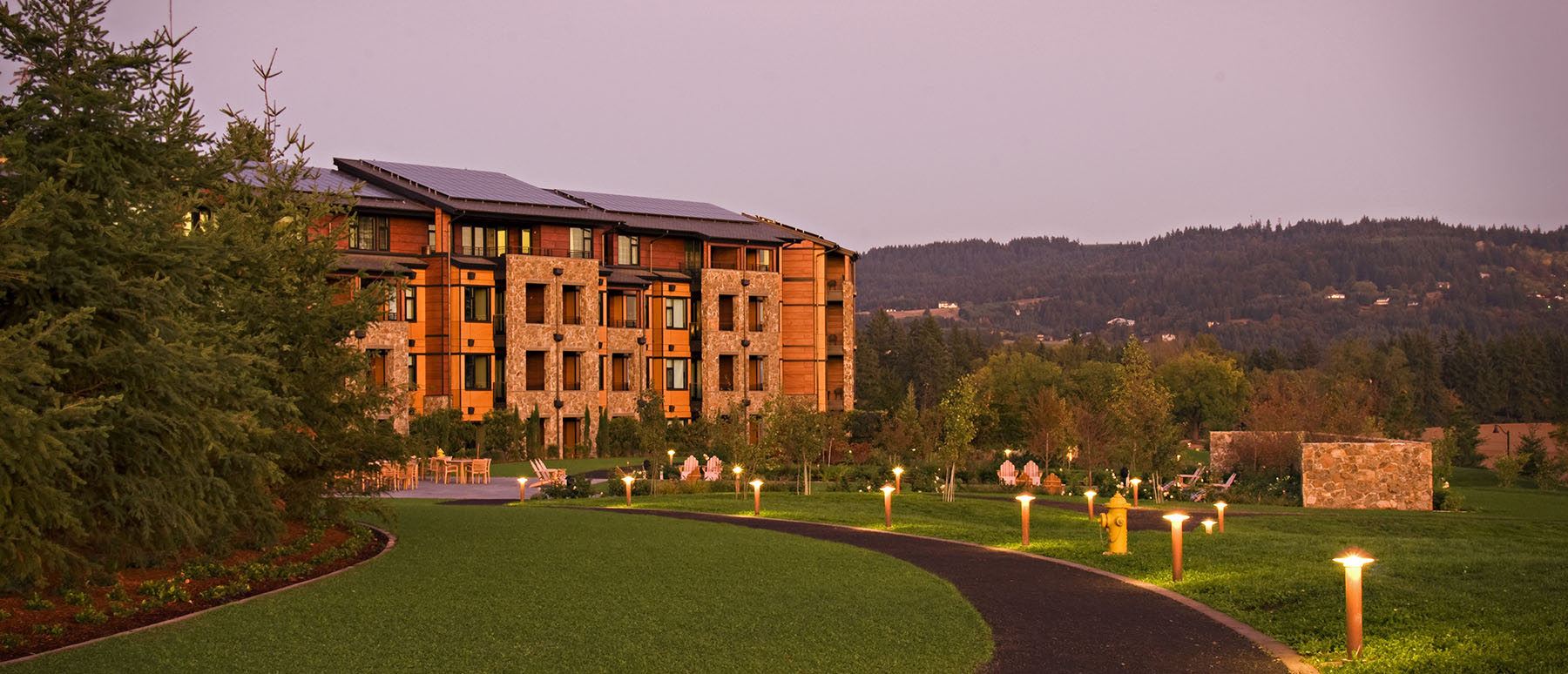“Product excellence by itself is not enough, the luxury brand must perform at an experiential level as well.”
-Rohit Arora, Strategic Planning Director, BPG Group
Many in the hospitality community perceive that sustainability comes at the expense of luxury. However, the market has transformed. Environmental stewardship can in fact attract potential visitors who seek substance in their luxury experience and can offer the additional benefit of energy cost savings to facility operations.
Several recent luxury projects, including The Allison Inn & Spa and the Sokol Blosser winery tasting room have used sustainability to support their mission and promote their luxury brands with great success. Post-occupancy review of these facilities’ energy use demonstrates that sustainability and luxury can indeed coexist ideologically and financially.
The Allison Inn & Spa
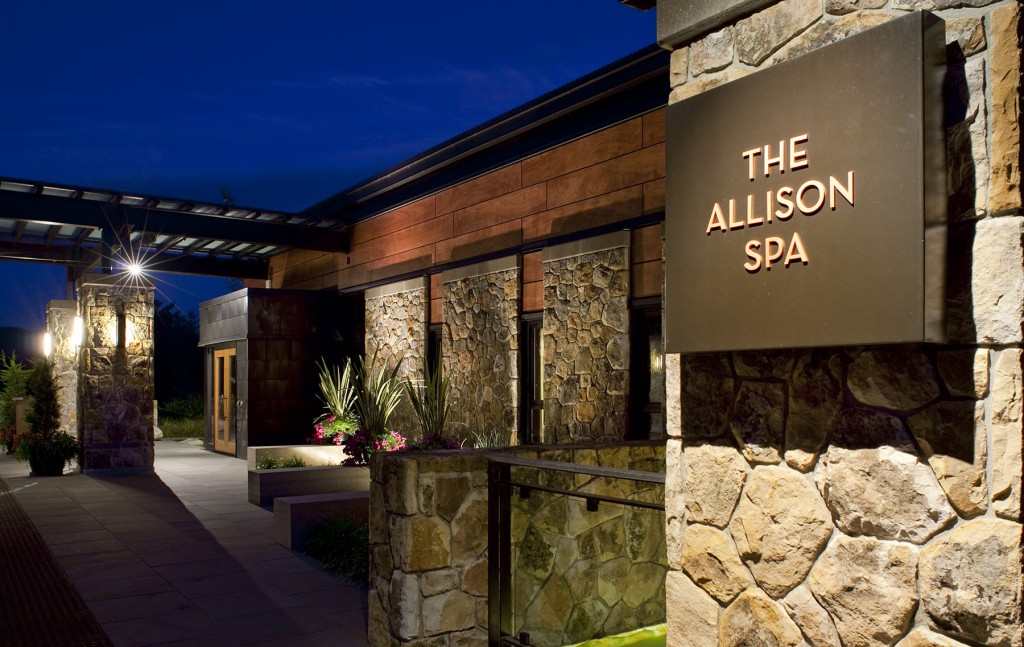
Located in Newberg, Oregon, and adjacent to the thriving wine country of Yamhill County, The Allison Inn & Spa combines luxury with a commitment to sustainable practices. The project features a 5-star hotel, indoor pool, restaurant, and a day spa. The single greatest energy use is the spa, which uses large volumes of hot water for luxurious treatments. The spa, combined with the guest rooms, pool, and kitchen, places a significant burden on hot water heaters to produce hot water for the various building functions. In the end, the Inn and Spa achieved LEED Gold status and more than 50% energy savings, compared to similar facilities, due to a strong focus on energy efficiency measures.
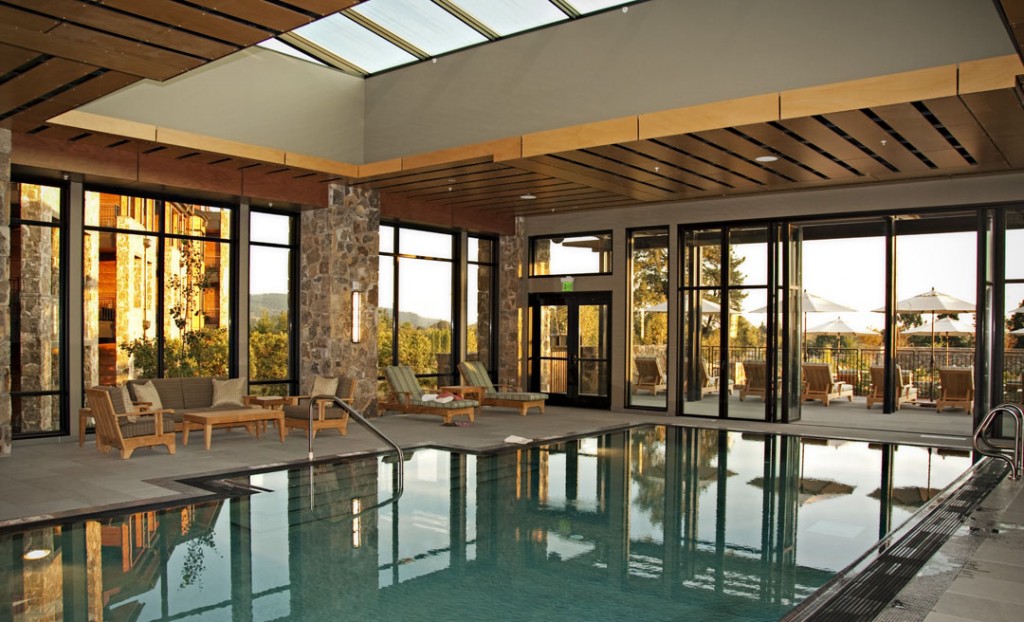
When the project began, the directive was to provide sustainable design solutions to maximize the operating efficiency while maintaining the luxury expected by guests. The result was the use of a variable refrigerant flow (VRF) system to maintain building comfort, dedicated outside air systems to provide fresh air, solar hot water panels to minimize gas consumption associated with hot water heating, and solar PV panels to produce as much of the building’s electricity as possible. The result is an integrated roof structure that harvests significant amounts of energy from the sun without impacting the views or the experience of staying at the hotel.
A comparable hotel would have an Energy Use Index (EUI) of 229 kBtu/ft2-yr in order to support the level of amenities. After completing the post-occupancy energy evaluation, we established that the building uses less than half the energy and operates at an EUI of 118, saving more than $200,000 per year in annual operating costs. The solar hot water and solar electric systems together offset nearly 20% of the annual energy consumed in by the building.
Lighting, sound, and thermal comfort play a key role in creating spaces that both relax guests and support diverse space uses. Brent Medsker of Glumac’s Lighting Design Studio paired light fixtures to every specific need, always with sustainability and aesthetics in mind. Multi-scene controls meet the diverse lighting needs of conference rooms with multiple uses and furniture arrangements. LED lighting above guest room doors and in the spa create ambiance and way finding while minimizing energy consumption. Controls and a range of lighting types in guest rooms enable guests to create custom conditions for relaxation in their private environment.
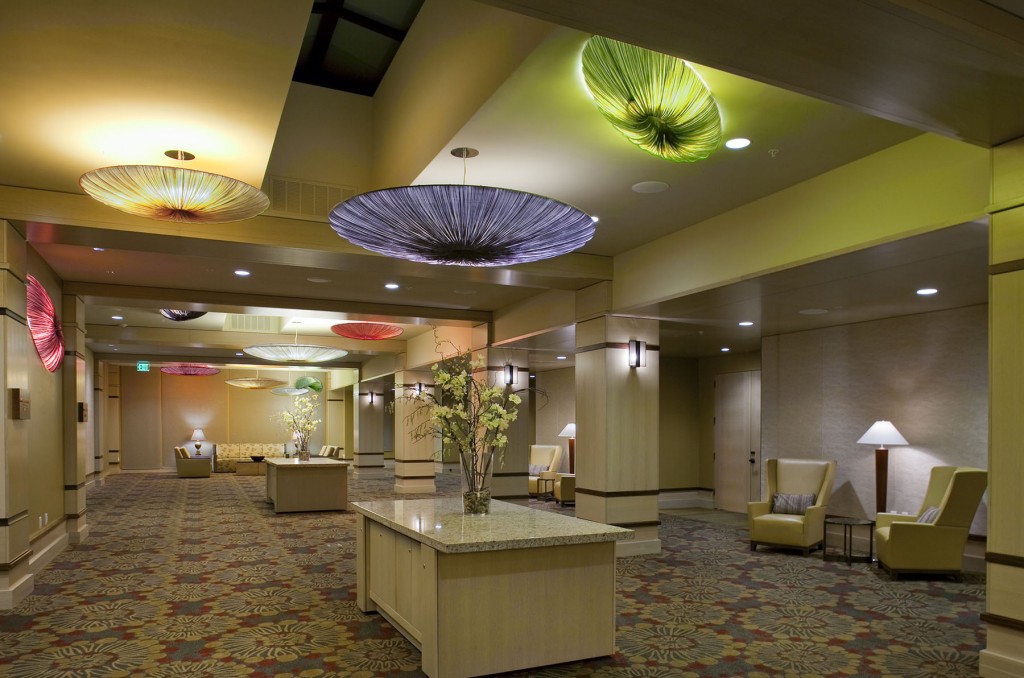
While the energy performance has been great, the reviews of the building have been even better. Further proving that sustainability and luxury can go together, The Allison Inn & Spa has received multiple awards and recognition for excellence in hospitality, wine, food and spa experiences, including:
- Trip Advisors Green Leadership Award, ranked second in the United States
- US News & World Report, ranked third best hotel in United States
- Wine Spectator, Best of the Award of Excellence in 2013
- Organic Spa, ranked first Eco Spa in 2013
- Condé Nast Traveler 2012 Gold List “The World’s Best 511”
For a comprehensive list, please click here.
Sokol Blosser Wine Tasting Room
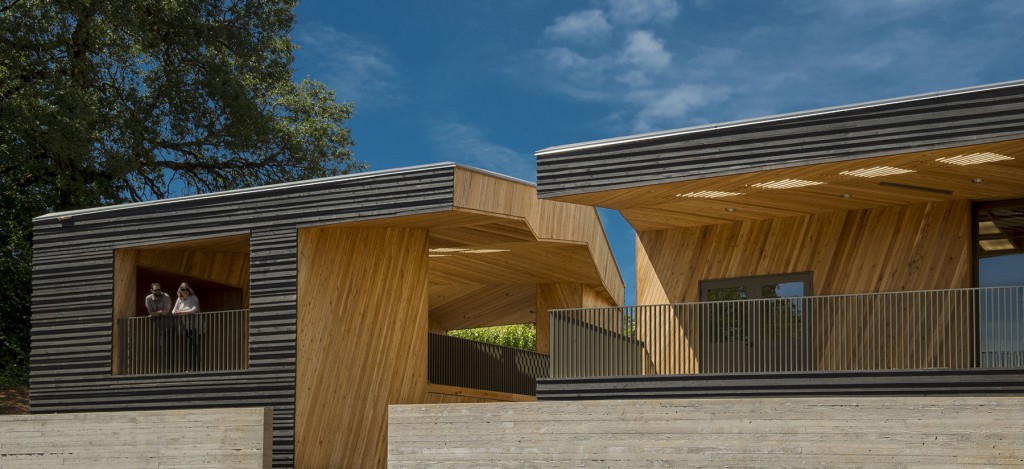
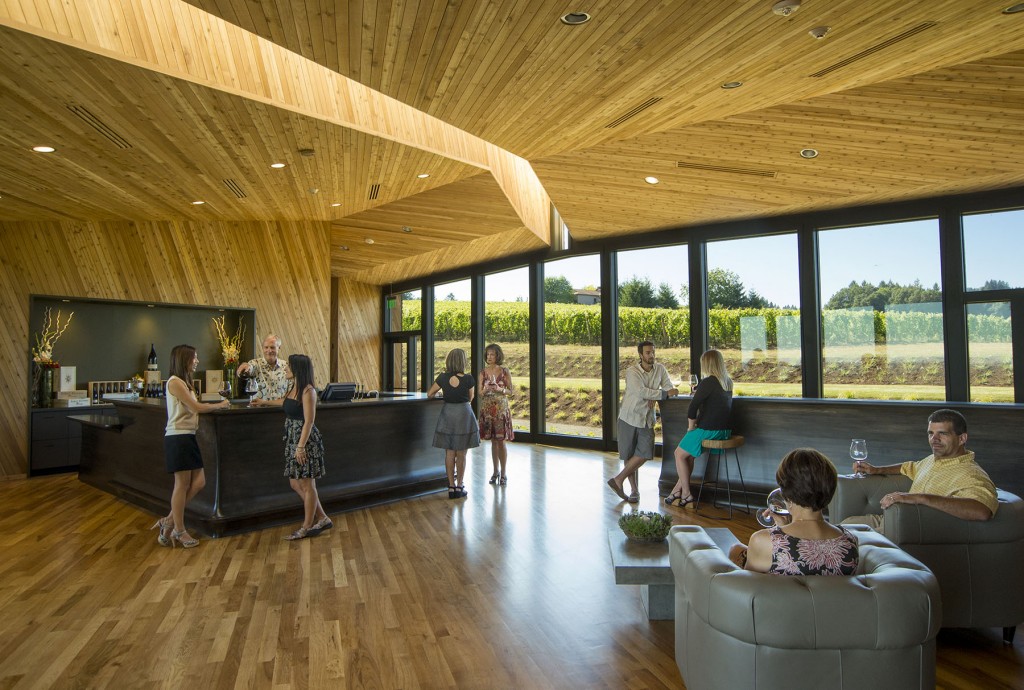
A short drive down Highway 99W from The Allison Inn & Spa sits Sokol Blosser, one of the pioneering wineries of Oregon. Bill Blosser and Susan Sokol Blosser first purchased the land in 1970 and planted the first grapes in 1971. From the beginning, both Bill and Susan understood the impact that typical farming and wine production have on the environment. To that end, one of Sokol Blosser’s values remains simple and focused: “be good to the earth.” A recent representation of their commitment to environmental stewardship can be found in their new wine tasting room designed by Allied Works Architecture of Portland. The new building pursued Living Building Challenge petal recognition, including Net Zero Energy certification.
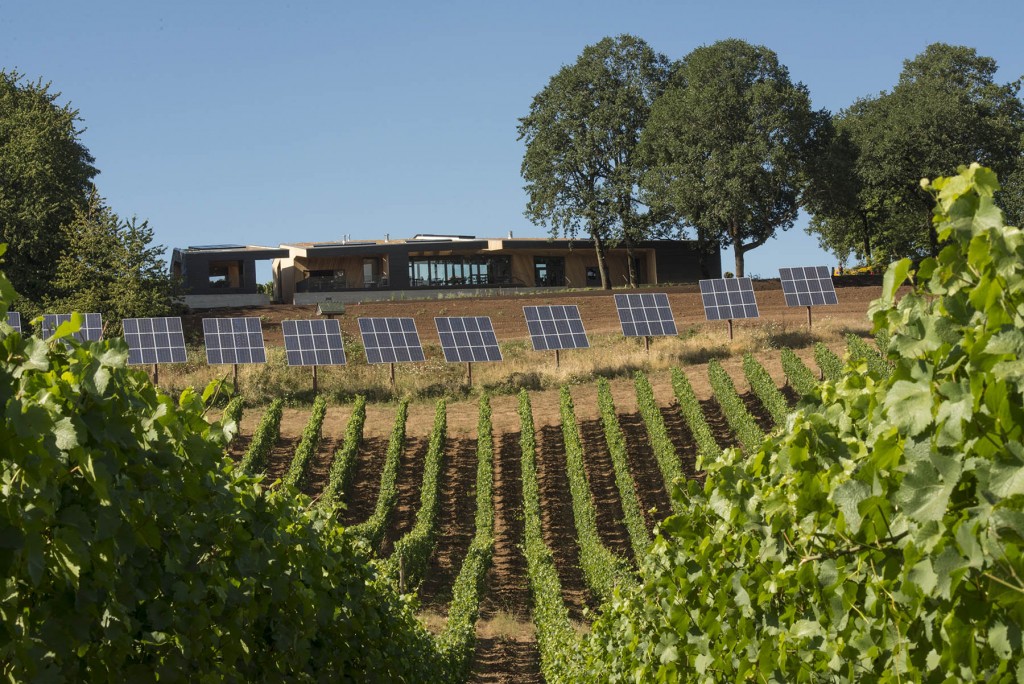
The project design targeted an EUI of just 20. This low energy consumption is to be offset by a 24 kW solar electric system installed at the south side of the building. In the first year of operation the building performed very close to expectations but missed the Net Zero Energy certification. The post-occupancy review identified key opportunities for improvement. For example, the energy use of the refrigerators, as provided by Energy Star estimates, assumes only a handful of uses per day for opening and closing a refrigerator. However, in a wine tasting room, servers are constantly opening the refrigerators to retrieve wines for customers to try. Through these lessons learned, Sokol Blosser’s staff is working together to identify and actively adjust areas to minimize unnecessary energy consumption. Sokol Blosser remains committed to Net Zero Energy long term, in addition to achieving a Net Zero Energy certification and is evaluating other steps including the potential of expanding their onsite solar electric system.
The world-class facility embraces the values of sustainability and provides an excellent road map to success without sacrificing the quality of the product. Sokol Blosser’s farm and new tasting room is a must-see experience for both wine and sustainability enthusiasts.
The Allison Inn & Spa and Sokol Blosser projects show that luxury now requires a strong demonstration of environmental stewardship to remain competitive with the best the world has to offer. Today, consumers increasingly demand that the things they enjoy in life have a minimal environmental impact. Luxury is truly being redefined through sustainability.

